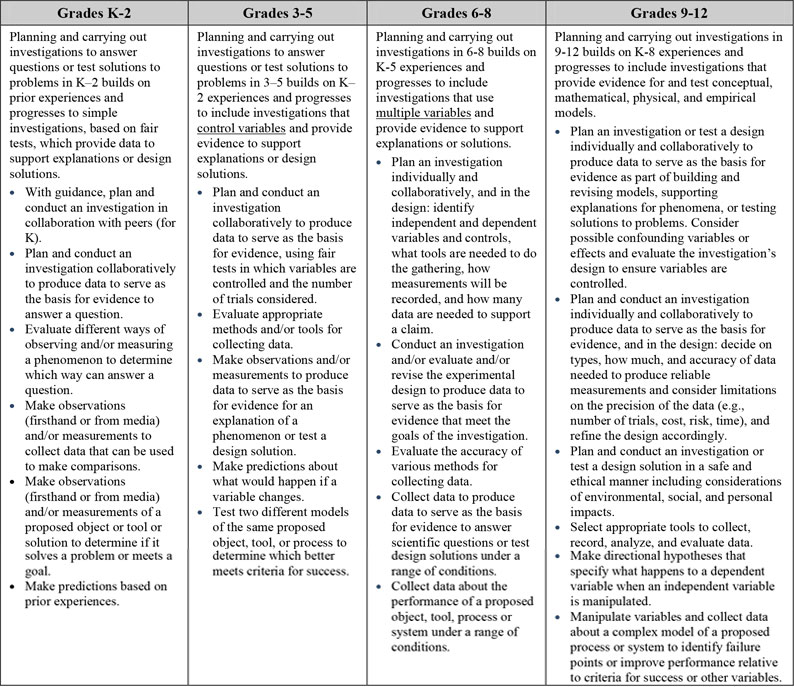Science & Engineering
Scientists and engineers investigate and observe the world with essentially two goals: (1) to systematically describe the world; and (2) to develop and test theories and explanations of how the world works.
The first goal, which includes, careful observation and description, often leads to identification of features that need to be explained or questions that need to be explored. The second goal requires investigations to test explanatory models of the world, their predictions and whether the inferences suggested by these models are supported by data. Such investigations require the ability to design experimental or observational inquiries that are appropriate for answering the question being asked or testing a hypothesis. This process begins by identifying the relevant variables and considering how they might be observed, measured, and controlled (constrained by the experimental design to take particular values).
See A Framework for K-12 Science Education, 2012, p. 59 for the entire text for Practice 3: Planning and carrying out investigations.
In the video below from BozemanScience.com, Paul Andersen explains how investigations are used by scientists to answer questions and by engineers to test designs. He delineates between investigative and observational science. He demonstrates the formation of good questions and the design of an effective investigation.
Planning & Carrying Out Investigations Progression through Gradebands:

Progression from NGSS Appendix F pgs. 7-8.
Activities
Three Conceptual Change Activities are included to help teachers and students Confront Beliefs:
- Planning & Carrying Out Investigations Activity #1: Data Collection Method Report
- Planning & Carrying Out Investigations Activity #2: Marshmallow Catapult Challenge
- Planning & Carrying Out Investigations Activity #3: Pringles Challenge
Also refer to Student Work in the Practice for real-life examples of how MPRES teachers have applied this Practice.
The purpose of these activities is to engage teachers in the Practice of Planning and Carrying Out Investigations. The emphasis is NOT on the activity itself, but rather the conceptual change related to the practice. Consumers of the Toolkit are reminded to not get wrapped up in the activity, but rather continually reflect on the conceptual nature of the Practice to gain deeper understanding.
To facilitate conceptual change throughout each activity, you should consider the following questions. These questions are also repeated at key points in each activity to assist you.
Awareness Questions:
- From the background information, what new awareness do you have about planning and carrying out investigations?
- In a 3-Dimensional classroom, who do you think needs to be planning and carrying out investigations?
- What questions did the background raise for you?
Expose Belief Questions:
- What are your current beliefs about this practice?
- In what ways do you think you are using this practice?
- What challenges do you see to using this practice?
Debrief activities by focusing on the conceptual understanding of the practice using the prompts (Resolving Belief Questions, Extend the Concept Questions, and Go Beyond Questions) included on the left side of each activity page.
Resolve Belief Questions:
- In what ways did this activity change your beliefs about planning and carrying out investigations?
- How could you assist students in refining this practice?
- What are the key components in planning and carrying out investigations that students need?
Extend the Concept Questions:
- How do you currently help students with planning and carrying out investigations in your classroom?
- What do you currently teach that lends itself to engaging students in this practice?
- Review a recent lesson you taught and evaluate the effectiveness of engaging students in planning and carrying out investigations.
Go Beyond Questions:
- Ask a colleague to observe one of your lessons OR video yourself teaching and reflect on your application of this practice.
- Use the EQuiP Rubric for Lessons & Units: Science(PDF format) to evaluate a recent science lesson you taught.


